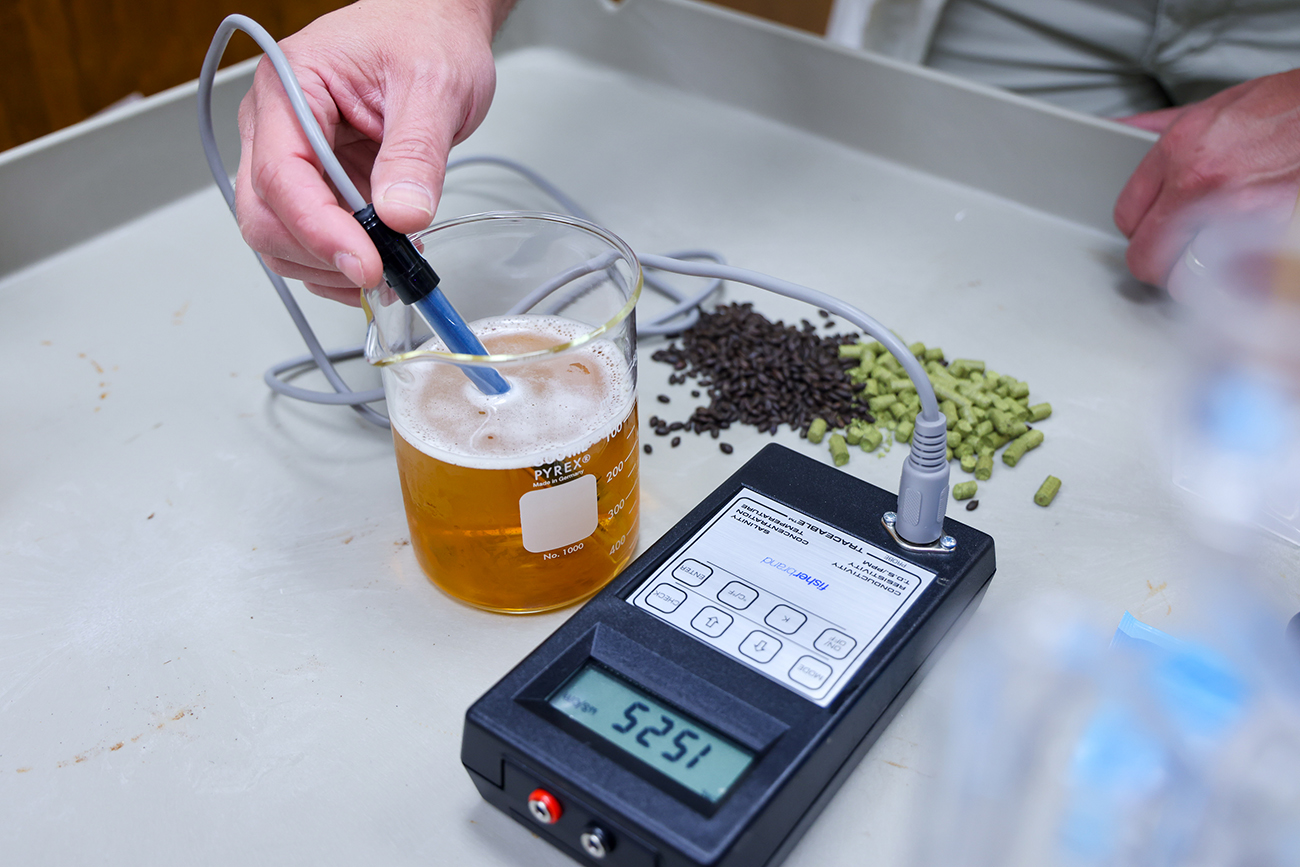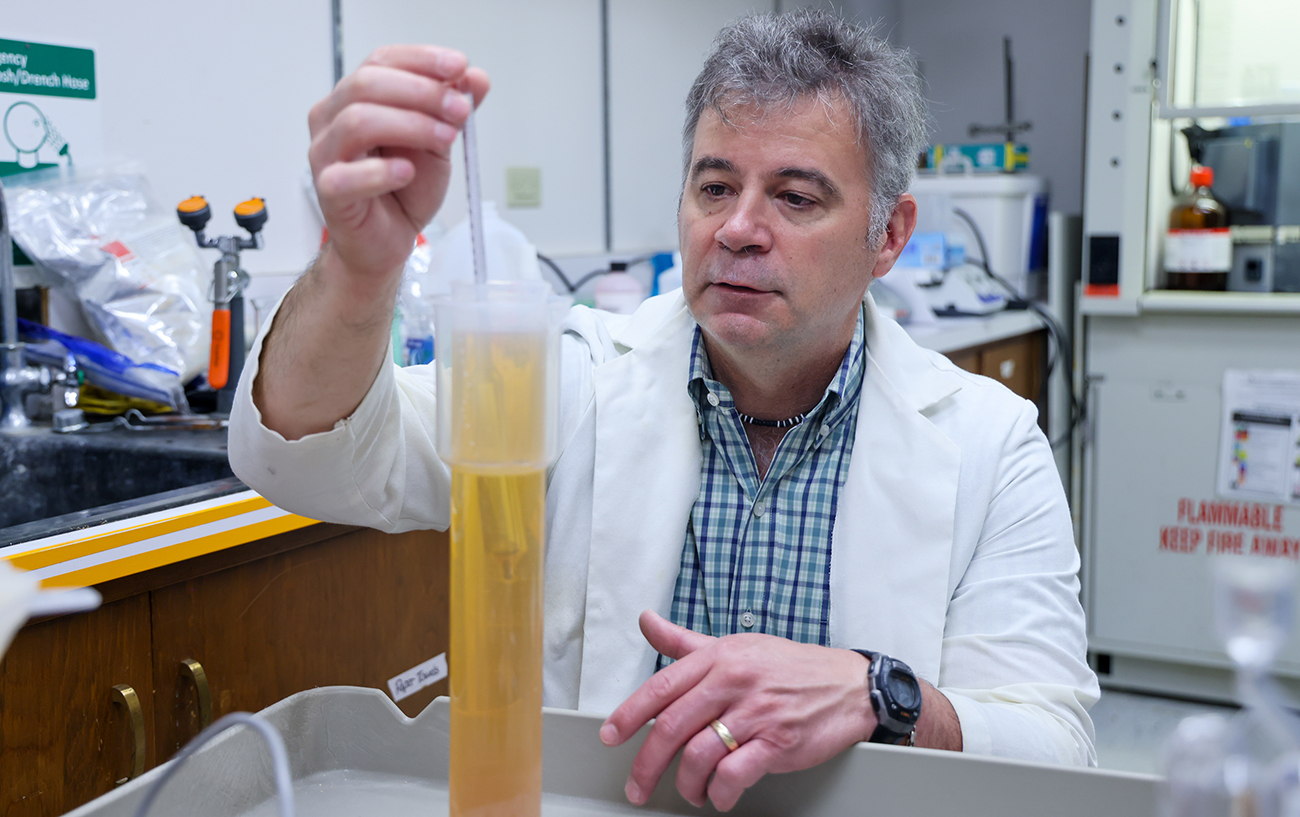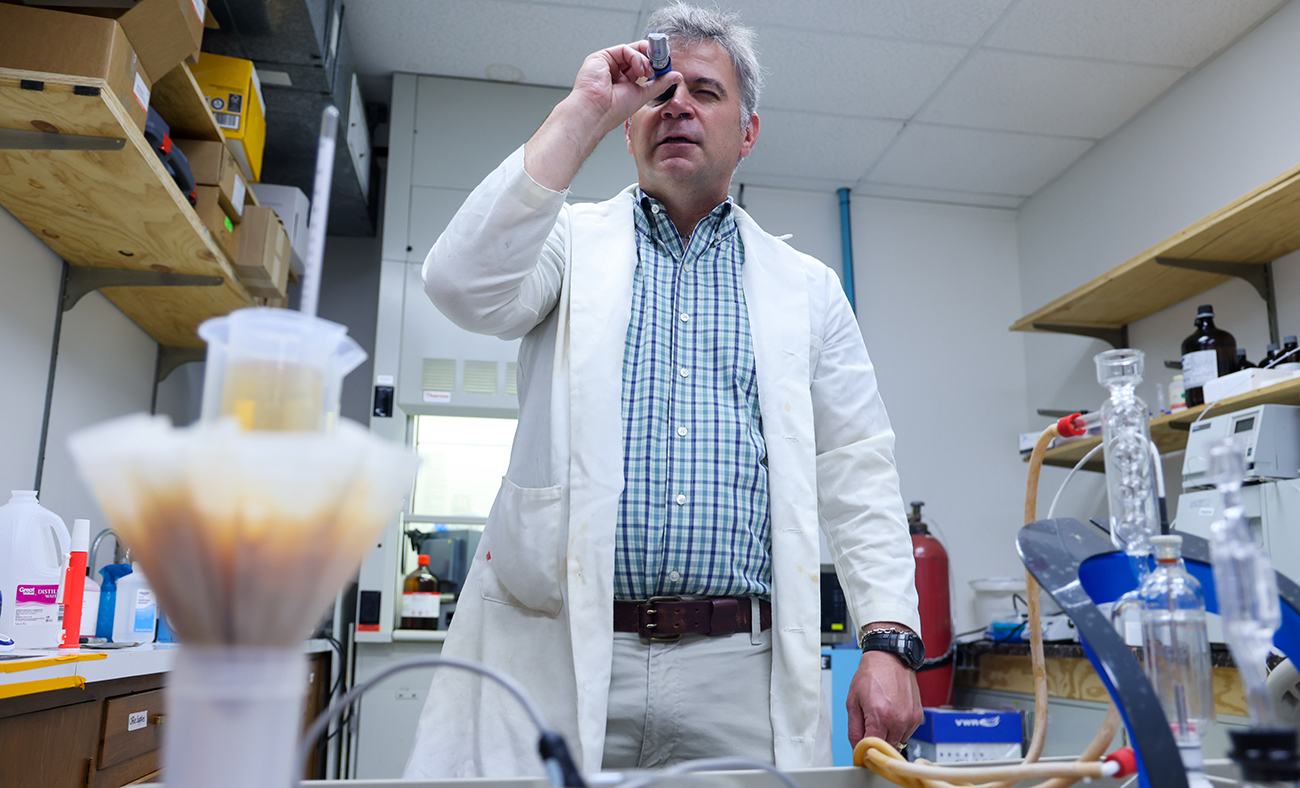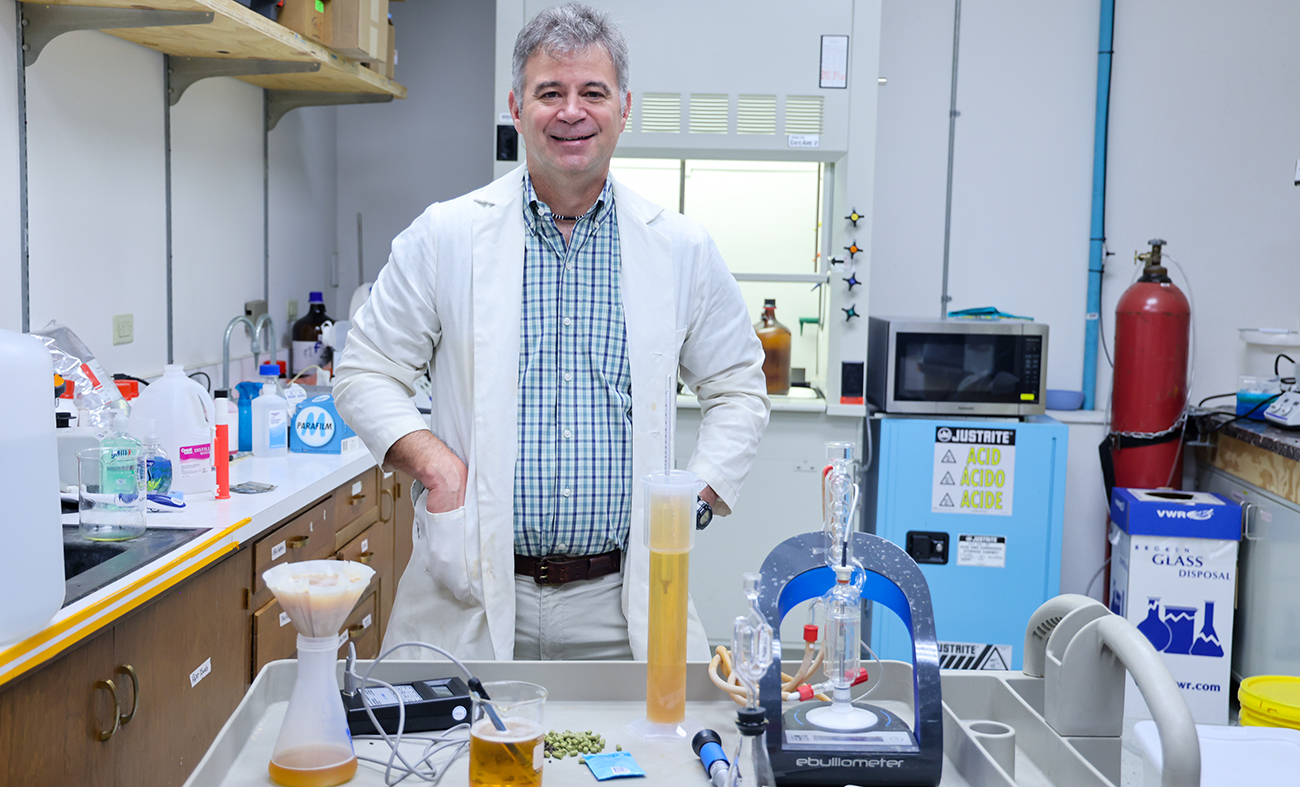- Featured
- Science
- Jon Mark Beilue
- Community
Jon Mark Beilue: At home, brew it yourself
Biochemistry professor Flynn has brewed beer for 30 years
What is it about chemistry teachers/professors that takes their expertise out of the lab and classroom and into other pursuits?
There was high school chemistry teacher Walter White, he of “Breaking Bad” fame, who used his background to make crystal meth in the Albuquerque drug underworld for money, the thrill of it all—and 16 Emmy Awards.
Then there’s West Texas A&M University biochemistry professor Dr. Nick Flynn, whose hobby is not as dangerous, illegal or profitable as that of the fictional White, but just as fun and fulfilling.
Flynn is a champion brewer of beer.
“It’s been pretty much a lifelong process,” he said.
At least lifelong in terms of the age he could legally drink the product. Growing up in El Paso, he earned his undergraduate degree in biochemistry from Texas A&M University. Shortly after graduation in the early 1990s, he was working security at a party.
The beer served was Shiner Bock. It came from the Spoetzl Brewery in Shiner, founded by Czech and German immigrants in the early 1900s. For Flynn, whose beers of choice had been the basic commercial kind, sampling the Shiner Bock was a bit of a revelation.
“I didn’t know beer could taste like this,” he said.

Photo: Dr. Nick Flynn found a passion for home brewing as a college student. He continues to thrive while teaching biochemistry at West Texas A&M University.
Most 20-somethings, when tasting a beer they like for the first time, make the researched decision to keep drinking that beer and leave it at that. But Flynn, being a newly graduated biochemist, had grander ideas. He thought he could brew his own beer, and if he was true to the science of it, make a pretty good batch.
Flynn got married in 1995, and brewed the beer for his wedding reception. And, as he says, he’s been in love with the process ever since.
“I’ve always been fascinated by it really,” Flynn said. “When I had that Shiner, the yeast has such a unique taste to it. Everything I had before that was lager. I got to looking at what was so different about all these beers, and that led me down a rabbit hole to get into brewing.”
Brewing kits at the time were inexpensive. Once Flynn bought the needed equipment, he did a cost comparison and happily discovered he could make the equivalent of 2 ½ cases of beer for the cost of a buying one case of good beer. For a graduate student, that was not to be taken lightly.
Always enjoyed teaching
While brewing beer could stretch a dollar, it was not going to provide Flynn with a career. Biochemistry would. While in high school, Flynn thought he’d eventually go to medical school until a doctor friend of his father asked what he was going to study in college.
“When I told him medicine, he quickly informed me there was no such thing as a medicine major,” Flynn said. “We got to talking and he knew I had always had an interest in biology and chemistry. Biochemistry was the best of both worlds. There are a lot of career opportunities.”
Research in the medical field as a freshman at A&M convinced him the medicine route was not for him. Flynn thought he would work in the industry.
An intersection of timing and opportunity guided him into teaching. While dropping off some graduation announcements, one of his professors was typing up an opening for a research assistant since the secretary was off that day. Flynn applied and was hired.

Photo: Homebrewing stretches Dr. Nick Flynn's skills as a biochemist.
“At one point, he had to go off to some meetings and asked me if would prepare a lecture for one of his grad classes,” he said. “I said, ‘Sure, anything you want to talk about?’ He gave me the topic and I probably spent 10-11 hours on that 75-minute lecture, but at the end of it, it’s kind of a cliché, but the time went by so fast. I thought that was pretty cool.”
Then while working on his Ph.D. at A&M, there was an opening for a teaching assistant and Flynn was encouraged to take it. He had enough on his plate, so why add more to it?
“I had a feeling I wanted to go into teaching, and when you’re told this will be great experience for you, you have to trust your mentor,” he said. “It was one of those things I enjoyed doing.”
Flynn received a postdoctoral fellowship to study Vitamin A metabolism at Columbia-Presbyterian Medical Center in New York City. Following that, his teaching career began at Angelo State University. In 2010, he joined the WT faculty, originally as head of the Math, Chemistry and Physics department.
His passion for beer brewing has followed. Flynn has been a longtime member of the American Homebrewers Association, then he discovered the local brewing community after meeting the father of one of the girls Flynn coached in soccer. He was a member of the Amarillo High Plains Drafters Homebrew Club and now, nearly a decade later, Flynn himself is the president of that local group. What’s more, earlier this summer, he won Gauntlet Brewing Challenge, an annual competition that is sponsored by High Plains Drafters and Auld Brewing of Borger and Lubbock.
Willing to experiment
The competition is a little different each year, but for the 2022 contest, brewers got the same recipe ingredients from Amarillo Brewing Supply, which this year included some spare smoked grain from Borger and Lubbock breweries. All ingredients must be used.
“At that point, it’s up to you how you do it,” Flynn said, “so it’s more about technique than recipe design.”
A scientist to his core, Flynn said he strayed away from the principles of science by modifying several variables in the carbonation instead of just one or two.
An online brewing website says if a person can make macaroni and cheese, he can brew beer. Yet the series of steps include malting, milling, mashing, extract separation, hop addition, cooling, aeration, separation of yeast from young beer and on and on and on. That sounds more complicated than putting together an upgraded box of mac and cheese.
“But if you can make a pot of stew,” Flynn insisted, “you can brew five gallons of beer.”

Photo: Dr. Nick Flynn has his eye on future prizes in brewing competitions.
Cleanliness and sanitation are crucial, he said. And sounding like a bit like Alabama football coach Nick Saban, Flynn said it’s also about respecting the process.
“Milling is really important and getting the correct crush on those grains,” he said. “If you don’t mill it right, you’re in trouble. And prioritize, prioritize, prioritize. Next step is getting the hops addition right. If you choose the wrong hops for a flavor or aroma addition, it will ruin your beer.”
Flynn brews his beer in his kitchen, cleaning as he goes. Some five-gallon recipes can be brewed as quickly as four hours. Others may take as long as seven hours. It depends on the time of the year how much brewed beer he has at home, but it’s always at least a couple of five-gallon kegs.
Flynn, whose professional research has included yeast metabolism, is a better brewer than he was five years ago, but he hopes not as good as he will be in five years. Three years ago, he took a three-course sequence on brewing through the Seibel Institute of Technology in Chicago, which has been focused on brewing education since 1968. August Busch III is one of its alumni.
“I absolutely can get better,” he said. “I don’t do it the same way every time. I always make sure to change something. So, as a result, it’s sometimes ‘Yep, that doesn’t work, I’m not going to do that again’ to “Oh my gosh, I’ll always do this from this point forward.’
“The most successful brewers are those willing to experiment a little bit. I take good notes too. Every single recipe has a two-page word document. That includes my ‘oops notes’ – don’t do that again.”
Do you know of a student, faculty member, project, an alumnus or any other story idea for “WT: The Heart and Soul of the Texas Panhandle?” If so, email Jon Mark Beilue at jbeilue@wtamu.edu .

